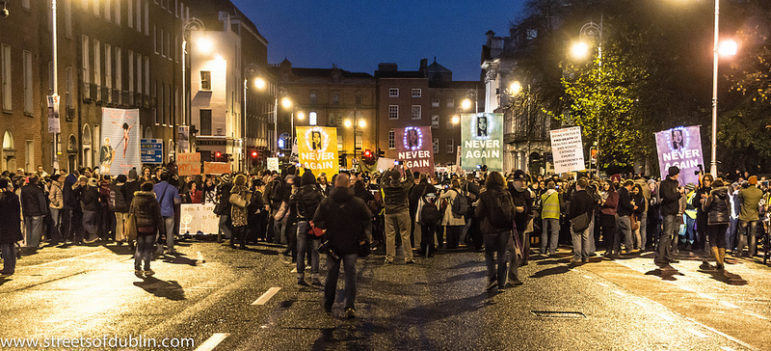
June 9, 2016; The Guardian
In a landmark ruling last week, the UN’s Human Rights Committee has found Ireland’s policy prohibiting abortion is a violation of women’s human rights and is calling on the country to revise its law. The ruling was made based on a complaint for a case from 2011, wherein a woman alleges that the consequences of Ireland’s abortion laws amounted to “cruel, inhuman and degrading treatment [that] encroached on her dignity and physical and mental integrity.”
In the Republic of Ireland, abortion is illegal unless the pregnancy poses a risk to the mother’s life, including suicide. While Northern Ireland is part of the UK, it also only permits abortions under strict circumstances, such as when the mother’s life is in danger. Ireland is the largest Western country that still criminalizes abortion.
In this specific case, Amanda Mellet and her husband discovered their fetus had congenital heart defects and would likely die in utero or soon following birth. She was given the option to carry the fetus to term, knowing it would not survive, or travel overseas to a country where she could get an abortion at her own expense. According to the woman’s complaint, the health personnel refused to provide her the care she needed, including grief counseling after the termination. The woman could not wait in the UK to bring the remains of the fetus back with her; instead, she unceremoniously received them in the mail three weeks later.
Not only did the woman have to manage the emotional toll of terminating her pregnancy in a foreign country without the physical presence and support of her family, but she also experienced the stigma of undergoing an abortion.
The Center for Reproductive Rights filed the complaint to the committee on behalf of Mellet. In its ruling, the committee recommends:
The State party should amend its law on voluntary termination of pregnancy, including if necessary its Constitution, to ensure compliance with the Covenant, including ensuring effective, timely and accessible procedures for pregnancy termination in Ireland, and take measures to ensure that health-care providers are in a position to supply full information on safe abortion services without fearing being subjected to criminal sanctions, as indicated in these Views of the Committee.
Sign up for our free newsletters
Subscribe to NPQ's newsletters to have our top stories delivered directly to your inbox.
By signing up, you agree to our privacy policy and terms of use, and to receive messages from NPQ and our partners.
According to the ruling, as Ireland has signed the International Covenant on Civil and Political Rights, it is obligated to compensate Mellet and to ensure similar violations do not take place in the future. As such, this obligation takes the ruling from an abstract statement of ethics to a document that could spur real change.
The executive director of Amnesty International Ireland, Colm O’Gorman, said, “The Irish government must act promptly. Ireland’s constitution is no excuse. It must be changed to allow the reforms required by this ruling.”
This is exactly what some advocates are hoping for, particularly in other similar countries that also restrict access to abortion. “The decision is so significant that lawyers who are working with women who have been denied access to abortion across the world will be very encouraged and will be using it in their work to seek justice for their clients and legal change in countries where access to abortion services is criminalized,” said Leah Hoctor, who is the regional director for Europe at the Center for Reproductive Rights.
Mellet responded similarly to the decision, hoping it may prevent another woman from undergoing the same trauma.
I hope the day will soon come when women in Ireland will be able to access the health services they need in our own country, where we can be with our loved ones, with our own medical team, and where we have our own familiar bed to go home and cry in. Subjecting women to so much additional pain and trauma simply must not continue.
Ireland’s abortion policies have been scrutinized for several years now, with Amnesty International dedicating campaigns to bring attention to the issue. In April, a Northern Ireland 19-year-old woman received a suspended three-month prison sentence after her housemates reported her to the police when she bought drugs online to miscarry her pregnancy because she did not have access to a healthcare provider who provides abortions. (Unlike Mellet, this young woman could not afford the trip to the UK.) Last November, a High Court in Belfast ruled that Northern Irish abortion laws violate human rights when they fail to provide exemptions in cases of sexual assault or fetal abnormalities. However, the judge also left the matter up to the lawmakers to reform the law.
In America, where abortion is legal, decreased accessibility to clinics equipped to conduct abortions is also already having a perceptible impact on women’s health. As NPQ reported, self-induced abortions are on the rise in Texas, where a 2013 law closed all but a handful of clinics in the state. If nothing else, we may see his ruling continue and empower reproductive rights activism in Ireland and abroad.—Shafaq Hasan











